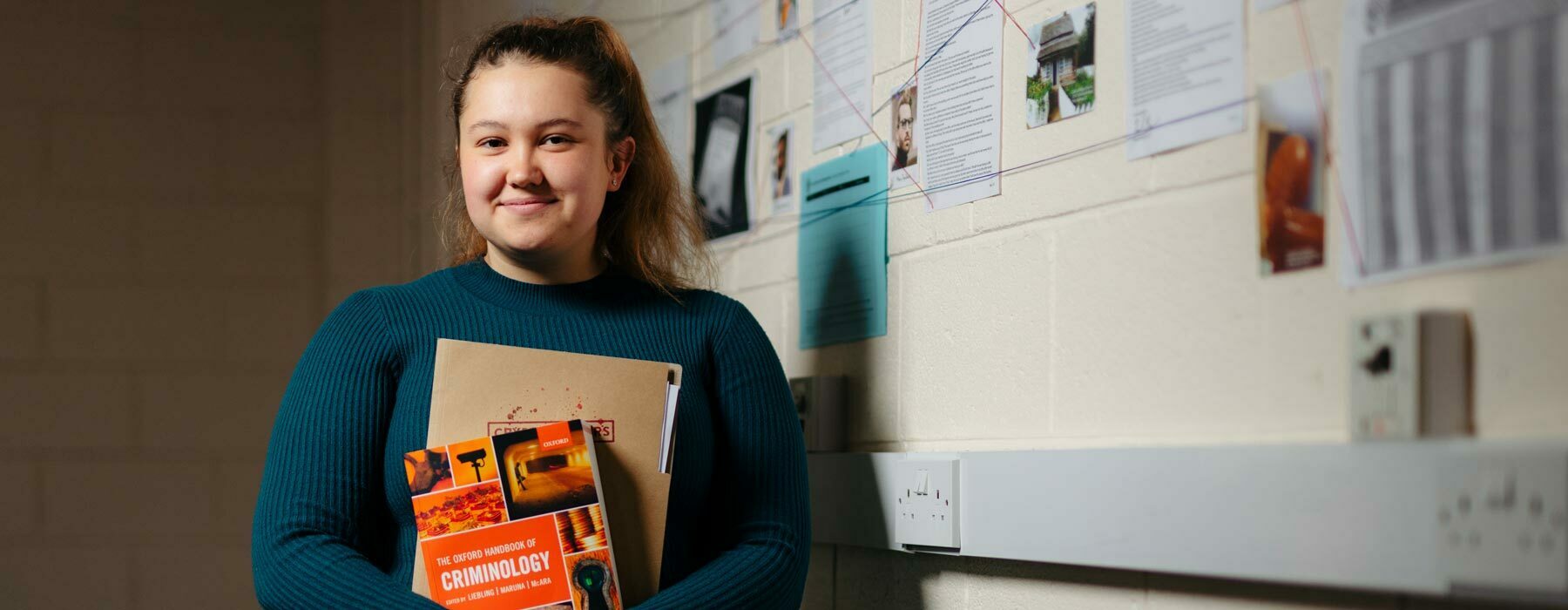
BA (Hons) Contemporary Criminology [Top Up]
Apply Full-Time Apply Part-Time Enquire about this course Download PDFJump to
Subject
Criminology and Psychology
Level
Bachelors Degree (Level 6)
Study Mode
Full-Time
Duration
1 year full-time/2 years part-time
Start Date
September 2025
The course
This is a vocational course that develops a range of practical and knowledge-based skills related to the Criminal Justice Sector. It examines traditional and contemporary thinking about the causes and effects of crime, how it impacts individuals and society.
You will be encouraged to challenge strategies to explore crime whilst developing an up to date critical approach to current issues in the criminal justice sector.
Through this programme, you will have the opportunity to interact with professionals in the sector increasing your employability and skills.
PLEASE NOTE: This programme is currently undergoing a refresh with the University of Hull to ensure you get the best experience and opportunity to achieve as an employment-ready graduate. The programme title, learning outcomes, modules, the teaching and learning strategy, contact hours and assessment strategies may change. Full details of the newly refreshed programme will be available later in the year and will be communicated to all applicants at the earliest opportunity.
Course Information
- Develop your understanding of the roles in the Criminal Justice System and security infrastructure.
- Enhance your critical and independent enquiry surrounding academic principles underpinning criminology.
- Enhance your theoretical knowledge and understanding of contemporary issues in criminology.
- Develop your understanding of the complexities of recidivism organisations face managing crime.
- Provide you with research opportunities in an area of criminology that you're interested in.
- Contemporary Issues in Criminology: This is a fluid module that embeds relevant current topics. It also discusses areas of criminology such as environmental issues, wildlife crime, piracy and globalisation. Geographical crime is a key aspect.
- Cyber Crime: An old crime with a new tool. This module investiages which that sit under this heading. Whilst new crimes are beginning to appear specifically linked to cyber crime, these crimes existed in a different format. Is trolling the same as stalking with a device? Is putting a derogatory comment on Twitter similar to that of a public order offence? As the internet currently has 3.9 billion internet users (2018), how do we police this? These are some of the questions asked in this module.
- Homicide - Violence and Crime: As violent crime continues to grow globally, this module discusses the recording of violent crime and the influences of said crimes. How violent crime is investigated will be debated in relation to the UK and globally. You will also discuss the stereotypical observations of the male being the culprit and the woman being the victim.
- Prison, Recidivism and Rehabilitation: Does prison work? was a question asked by theorists. When we consider figures of re-offending one would suggest prison does not work. You will address processes and support, considering alternate approaches and comparing international processes.
- Dissertation: A chance for you to choose the area which interests you, or choose your desired career path and research a specific area within that. This module will run as independent study with support from the University Centre team.
You will need a relevant Level 5 qualification and an appropriate academic reference.
Life and/or experience of non-traditional students will be taken into account when considering applications. The successful completion of an entry task may be required when considering applications without the required formal entry qualifications.
If your first language is not English, or a Tier 4 student visa to study is required and GCSE grade C/4 English or equivalent is not held, English language proficiency level such as International English Language Testing System (IELTS) 6.0 overall (with a minimum 5.5 in each skill) will need evidencing.
This programme is delivered with a variety of learning and teaching approaches to include all students learning styles and preferences.
For all modules, theory lectures are delivered that aim to deliver the core content and provide you with underpinning knowledge. To complement these theory lectures, you will have group seminar sessions that are used to reinforce concepts delivered theoretically.
The teaching methods focus on facilitating a student-centered approach to enhance your independent learning outside of the classroom.
Teaching will take place at the Bishop Burton campus in East Yorkshire, UK.
As a full-time course, this programme includes approximately 10 to 16 hours a week of teaching, including lectures, seminars, debates and tutorials. You are also expected to carry out a significant amount of private study in addition to contact time (25-30 hours a week).
Studying part-time you will have approximately 5-7 hours of contact time each week, including lectures, seminars, practicals and tutorials. You are also expected to carry out a significant amount of private study in addition to contact time (18-20 hours a week).
You can expect to receive your timetable during induction week.
- There may be additional costs for DBS if you are seeking additional experience within relevant sectors. The cost will be dependent on the level of check completed, and would be at your expense. You can check the current cost on the www.gov.uk website.
- A suitable electronic device, e.g. a laptop or tablet, with internet connectivity is required for accessing online learning.
- Any educational visits/trips and enrichment activities will be additional to the course fees. You will be made aware of these optional visits and associated costs as required.
- On successful completion of the programme, you will have the opportunity to graduate at a ceremony wearing formal dress. The hire of the formal dress is an additional cost.
Validated by University of Hull
We are proud to collaborate with University of Hull on the validation of this course.
This includes transforming our programmes to ensure that we meet the evolving needs of the sector, giving you the best opportunities for success when you graduate by having a competence-based focus. Find out more about competence-based higher education.
View the policies and procedures you would be agreeing to comply with by registering for this programme. This encompasses University of Hull Quality and Standards, including a Guide for Collaborative Provision students.
Financial Information
Find the full details of the fees associated with this programme and the financial support available.


